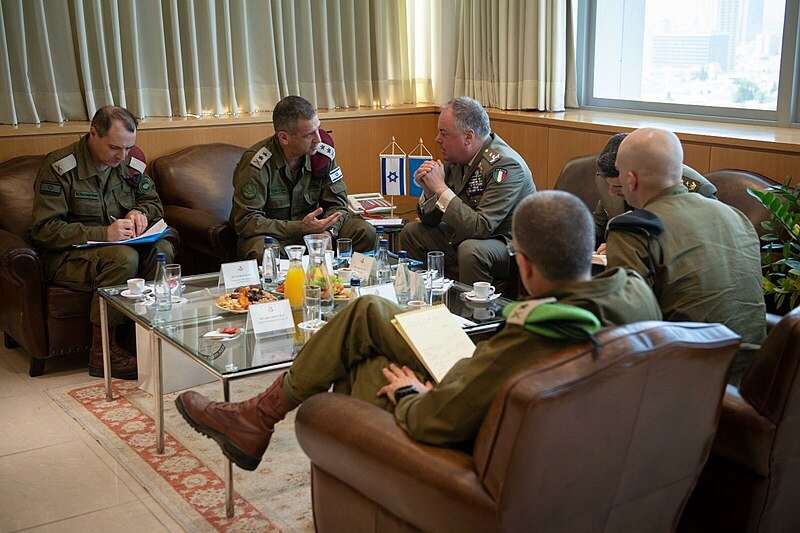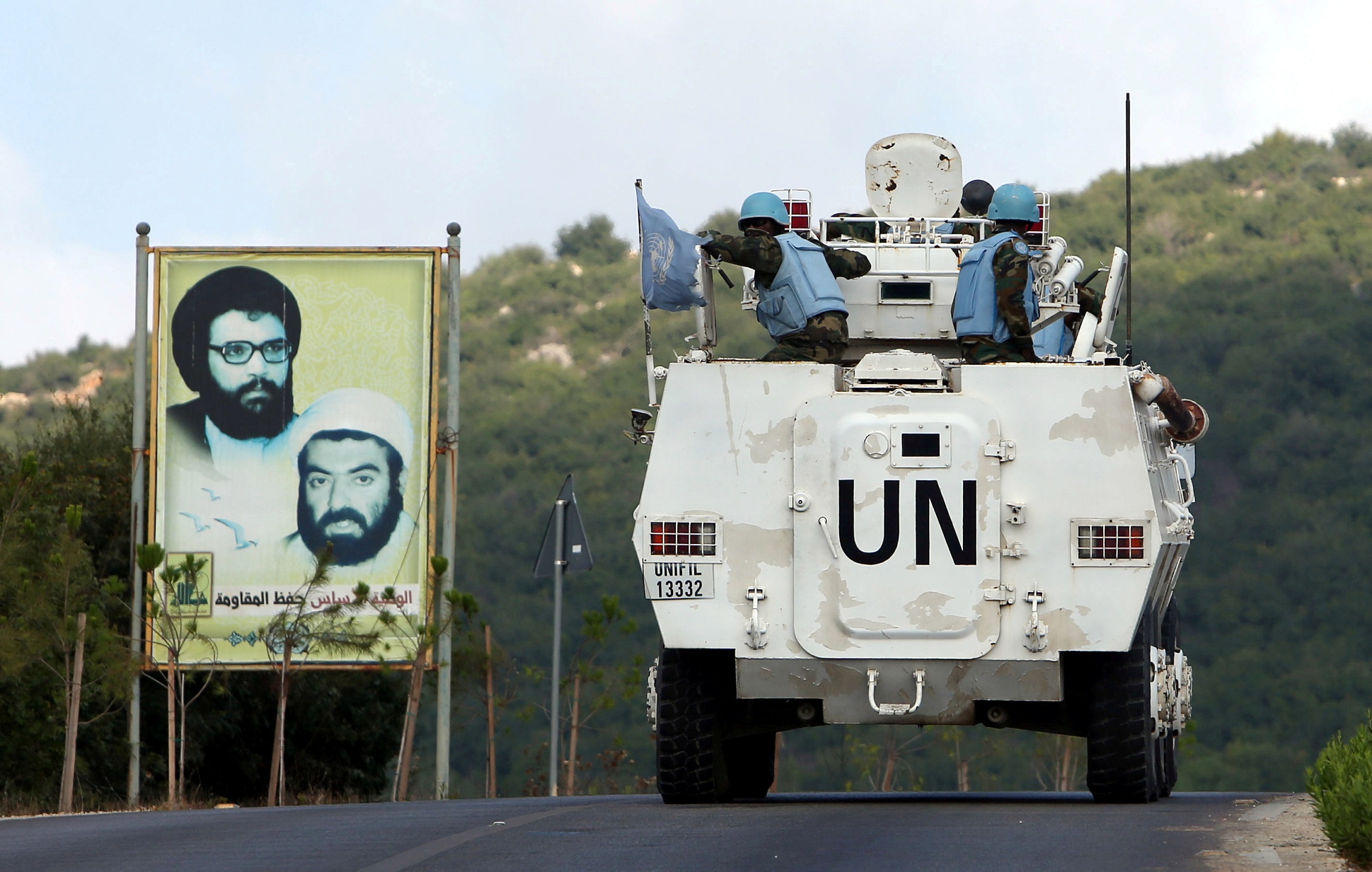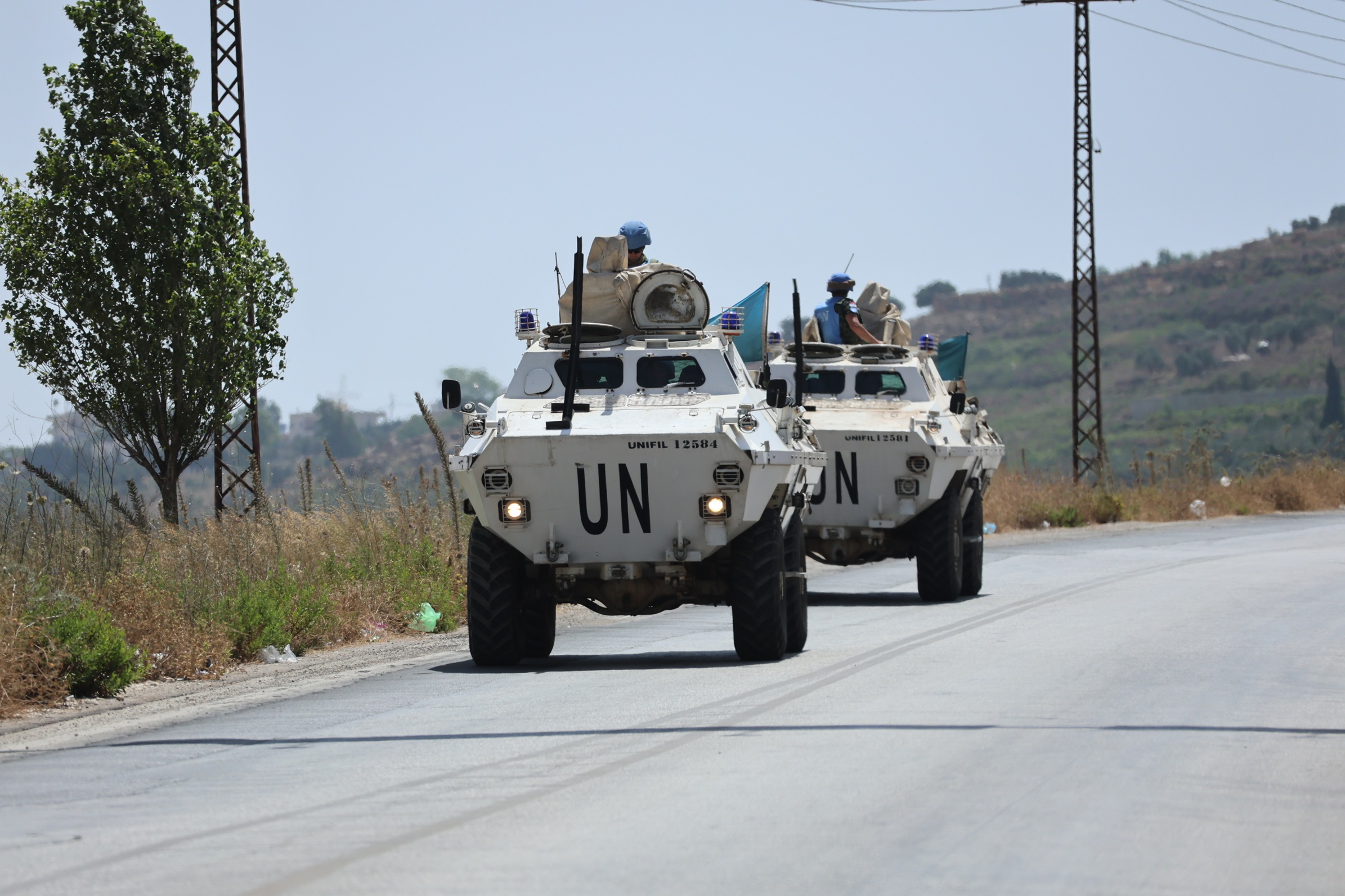Publications
INSS Insight No. 1906, October 30, 2024
During the war between Israel and Hezbollah, and especially since the IDF launched its ground operation in southern Lebanon, the widespread presence of Hezbollah along the border between Israel and Lebanon has highlighted the ineffectiveness of UNIFIL. At the same time, friction between the IDF and UNIFIL is increasing, with the latter claiming its forces have been harmed. While Israel’s interest in establishing an improved security regime along the border on “the day after” is incompatible with UNIFIL’s continued presence in its current form, based on UN Security Council Resolution 1701, it may be difficult to reach an agreement on any other force. Therefore, Israel’s demands during ceasefire negotiations should include revising UNIFIL’s mandate and its resources to allow for more effective oversight of Hezbollah’s activity in the region.
During the war between Israel and Hezbollah, which has been ongoing for a little over a year, UNIFIL—the United Nations’ peacekeeping force in southern Lebanon—has significantly scaled back its operations in that area. A report issued by UNIFIL in July, covering the period from February to June, states that its bases were damaged on 25 occasions, including one incident on March 30, in which four UNIFIL soldiers were wounded. The report did not specify who was responsible for these incidents and merely issued a warning against escalation. The friction between the IDF and the international force increased when Israeli troops entered southern Lebanon on October 1 in an operation designed to eliminate Hezbollah’s military presence in the villages next to the border, in order to create a new security situation for Israel and to allow tens of thousands of evacuated Israelis to return to their homes in the north of the country. Since then, UNIFIL has significantly scaled back its operations: its soldiers remain largely inside their bases, and they rarely move around, except for limited humanitarian aid operations to Lebanese civilians and to provide their own forces with supplies. The IDF, for its part, uses existing communication channels to inform UNIFIL in advance about its operations near the international force’s positions. Nonetheless, UNIFIL has recently stepped up its criticism of the IDF’s operations against its personnel and outposts.
On October 6, UNIFIL published a statement expressing grave concern over the IDF’s operations near its positions, stating that these operations endangered its soldiers. Subsequently, complaints were filed regarding harm to UNIFIL soldiers, with allegations that IDF troops deliberately opened fire on UNIFIL positions—a blatant violation of international law. Among the allegations were that UNIFIL’s headquarters in Naqoura had been damaged several times; that on October 13, two IDF tanks broke through the gates of a UNIFIL base, emitting smoke that injured several personnel (the IDF claimed that it was evacuating wounded soldiers); and that on October 20, an IDF bulldozer demolished a UNIFIL observation post in Marwahin. Israel, for its part, clarified that the damage was not deliberate in any of these cases but occurred as a result of Hezbollah’s using UNIFIL soldiers as human shields. The IDF even uncovered the entrance to an underground tunnel just meters from one of UNIFIL’s bases. Following harsh criticism of Israel, on October 13, Prime Minister Benjamin Netanyahu reiterated Israel’s request for UNIFIL to evacuate its soldiers from the combat zones in southern Lebanon. This request was again rejected outright by UNIFIL’s spokesperson and other United Nations officials, who argued that the soldiers are deployed in accordance with a Security Council resolution and will only leave if decided by the Security Council.
UNIFIL in the Aftermath of the Second Lebanon War
UNIFIL has been operational in Lebanon since 1978, but its presence was strengthened following UN Security Council Resolution 1701, which brought an end to the Second Lebanon War in 2006. There are now 10,000 UNIFIL soldiers from 50 countries, supported by an annual budget exceeding $500 million. In recent years, as it became unmistakably clear that UNIFIL was not fulfilling its primary mandate—overseeing the prohibition of Hezbollah’s military presence in southern Lebanon—Israel’s dilemma regarding UNIFIL’s role became even more acute.

According to the mandate, the government of Lebanon, with UNIFIL’s assistance, was supposed to prevent the presence of any armed forces south of the Litani River, other than the Lebanese Army. Over the years, however, UNIFIL’s freedom of movement became heavily restricted by Hezbollah, and its soldiers were not allowed to move around without permission from the Lebanese side. In contrast, Hezbollah operatives were able to travel south without any impediment, where they then prevented UNIFIL from accessing the areas they had taken over, using these locations to amass weapons to attack Israel in a future war. At a UN Security Council meeting, Israel’s ambassador to the UN, Danny Danon, stated that while Israel does not expect UNIFIL to fight Hezbollah, it does expect UNIFIL to at least report accurately on the situation in southern Lebanon, from where most of the missiles aimed at Israel are launched.
In light of UNIFIL’s failure to prevent Hezbollah from establishing an extensive presence and building its military strength in southern Lebanon, Israeli leaders have engaged in a years-long debate over its policy vis-à-vis UNIFIL. This debate intensifies each time the Security Council votes on extending UNIFIL’s mandate. Some in Israel have argued that the international force is ineffective and that the government should push to end its mandate or at least scale it back since it does not fulfill its purpose. They contend that UNIFIL’s presence is even a burden on Israel, given that it restricts the IDF’s freedom of operation, particularly during wartime, when the IDF takes great care to avoid injuring UNIFIL soldiers. During the Second Lebanon War, the presence of UN forces complicated the IDF’s operations, and, in one case, the army was forced to halt operations entirely following the attack on four officers from the United Nations Truce Supervision Organization (UNTSO), responsible for overseeing the 1949 armistice agreement between Israel and Lebanon.
Conversely, others have argued that the presence of an international force is important, although it does not fulfill its purpose, and that instead of trying to end UNIFIL’s mandate, Israel should advocate for expanding its authority and ensuring it has the capability to carry out its complex mission. In peacetime, UNIFIL also plays a crucial communications role, facilitating messages between the IDF and the Lebanese Army within the framework of the tripartite military committee established in 2006. This committee, however, ceased operations on October 8, 2023, when Hezbollah began its attacks against Israel.
Israeli Efforts to Improve UNIFIL’s Mandate
Over the years, Israel has sought to expand UNIFIL’s mandate to ensure it fulfills its original purpose, and over the past two years, it has focused on improving the force’s effectiveness, particularly in terms of changing the modus operandi in which UNIFIL soldiers are unable to report on significant violations by Hezbollah in southern Lebanon. In 2022, during a UN discussion on UNIFIL’s mandate, Israel succeeded in amending UN Resolution 2650 of August 31, 2022, to address UNIFIL’s freedom of movement. Clause 17 of the resolution “demands the parties to cease any restrictions and hindrances to the movement of UNIFIL personnel and guarantee the freedom of movement of UNIFIL, including by allowing announced and unannounced patrols.” In practice, however, there was no significant change in UNIFIL’s operations, as it has remained fearful of Hezbollah’s response. Nevertheless, the change in the resolution’s wording alarmed Hezbollah, as reflected in a speech given by its leader, the late Hassan Nasrallah, on September 17, 2022, in which he claimed the amended resolution was an Israeli plot and a gross violation of Lebanese sovereignty. Nasrallah also stated that UNIFIL assured Hezbollah that it would not change its activities and that Hezbollah would not accept coordination with or supervision by the Lebanese Army. Hezbollah’s position was underscored in December 2022, when it opened fire on a UNIFIL vehicle that had entered a Shiite village, killing an Irish UNIFIL soldier and wounding three others, on the claim that UNIFIL had no authority to be there without its permission.
Despite the ineffectiveness of the amended resolution, in August 2023, ahead of the extension of the mandate, Lebanon’s representatives at the UN, under pressure from Hezbollah, forcefully demanded the removal of the freedom-of-movement clause. Hezbollah claimed that this clause was designed to turn UN soldiers into spies for Israel. Lebanon further demanded that all UNIFIL activity be coordinated with the Lebanese Army and even threatened to withdraw its support for extending the mandate. Ultimately, the Lebanese settled for a general statement on the need to ensure coordination between UNIFIL and the Lebanese government but did mange to get Russia and China to abstain from the vote—a rare move by both countries.

Ostensibly, this was a victory for Israel’s diplomatic efforts, aided by the United States, the United Kingdom and the United Arab Emirates, as the 2023 resolution retained and even strengthened those clauses on UNIFIL’s freedom of movement. The resolution also explicitly demanded that the Lebanese government grant UNIFIL soldiers access to any location required to carry out their investigations, removing many obstacles that had prevented them from doing so and ensuring that its soldiers are protected against risks and harassment (UN Security Council Resolution 2695, from August 31, 2024). However, this has little practical impact, especially after October 8, 2023.
At the same time, Lebanon, as well as Western powers working to stabilize the situation there, had a clear interest in maintaining UNIFIL’s authority despite the long war of attrition fought between Israel and Hezbollah throughout 2024. Thus, on August 28, the UN Security Council unanimously passed Resolution 2749, extending UNIFIL’s mandate for another year at Lebanon’s request, as the mandate was set to expire at the end of August. If the resolution had been defeated or if one of the five permanent members had used its right of veto, UNIFIL would have been forced to swiftly withdraw from Lebanon.
The resolution urges Israel and Lebanon to fully implement Resolution 1701, avoid any further escalation, restore stability along both sides of the border, and avoid harming the international force. Hezbollah, however, is not mentioned in the resolution at all, and, after voting, the US representative expressed regret that several Security Council members had blocked the possibility of condemning Hezbollah, which began attacking Israel on October 8, the day after Hamas’s attack on Israel. It was France that spearheaded the efforts to get the mandate approved without any changes, due to the conflicting demands of the parties. France and the United States even sought to avoid a veto by Russia and China as they did in the 2023 resolution due to a dispute over UNIFIL’s freedom of operation. There was also a dispute about the duration of the mandate’s extension: Israel, backed by the United States, advocated that UNIFIL’s mandate be extended every six months in order to enforce Resolution 1701 more strictly but eventually was forced to drop this demand due to Lebanese opposition.
The Role of the International Force in Reaching an Agreement to End the War
Despite UNIFIL’s poor performance, the current proposals to end the ongoing war between Israel and Hezbollah still envision a central role for UNIFIL, mainly because Lebanon has signaled its acceptance of this, supported by widespread international backing for Resolution 1701 and the recognition that it is unlikely that the parties would agree to the presence of any other international force. Up until September 2024, when the IDF launched Operation New Order to strike Hezbollah and deployed its ground forces in Lebanon, a proposal by US mediator Amos Hochstein, coordinated with France (which had offered a similar proposal), was on the table. This proposal included, in the first stage, a ceasefire, Hezbollah’s withdrawal of its forces to around 10 kilometers from the Blue Line, and the deployment of UNIFIL and the Lebanese Army along the Israel–Lebanon border to jointly enforce Resolution 1701 and prevent Hezbollah from reapproaching the border. However, with the war’s escalation, it seems that this framework will not be enough.
Various players within Lebanon still support Resolution 1701 and are adamantly opposed to any changes to it, while Israel’s demands have expanded. Media reports indicate that Israel seeks substantive revisions to UNIFIL’s mandate; Hochstein’s latest proposal, submitted during his visit to Beirut on October 21, included adding a provision to Resolution 1701 to ensure that it is enforced. At this stage, however, it seems that the sides are still a long way from reaching an agreement, particularly with Hezbollah, which, despite recent setbacks, rejects changes to the resolution. Hezbollah’s position was communicated to Hochstein by Nabih Berri, the speaker of the Lebanese Parliament, who is seen as representing Hezbollah’s views.
Conclusion and Recommendations
The exposure of Hezbollah’s extensive and deep presence and its operational readiness for war in the area south of the Litani River—a flagrant violation of UN Resolution 1701—strongly underscores UNIFIL’s inability to fulfill its mandate. It has been proven that its current authority and the resources granted to it are inadequate and that it will not be able to continue operating in its current format “the day after” the war between Israel and Hezbollah. The main problem with Resolution 1701 was and still remains the implementation and enforcement of its provisions; thus, any ceasefire agreement to end the war must include the changes necessary to create an improved security reality along the border while also preserving Israel’s freedom of operation if it becomes apparent that Resolution 1701 is not being enforced.
With regard to UNIFIL, Israel is advised to:
- Not give up on the presence of an international force. In the past, proposals for the involvement of Western forces (the United States, Germany, and the United Kingdom) were raised, but it appears that the chances of this happening are slim; therefore, Israel should not give up on UNIFIL as long as no other forces are agreed upon.
- Continue to endorse Resolution 1701 as the foundation for any agreement, given Lebanon’s commitment to it as the basis for UNIFIL’s operations. At the same time, the Israeli government should make it clear that, due to its ineffectiveness, the resolution must be amended (although the chances of this happening in the Security Council are minimal) or supplemented with an addendum or agreement to ensure its enforcement.
- Insist on establishing an effective mechanism to enforce Resolution 1701, in part by strengthening UNIFIL’s capabilities and the means of supervision at its disposal (such as an advanced location system, drones, and night-vision equipment). Additional measures could include detailed reports to the Security Council and monitoring of Lebanon’s international border crossings to prevent arms and ammunition smuggling to Hezbollah. Ideally, this would be done by a different body.
- Agree simultaneously to the upgrade and expansion of the Lebanese Army, which would work in coordination with UNIFIL, provided there is a mechanism to oversee the personnel deployed in southern Lebanon to ensure that no Hezbollah affiliates are deployed and that all equipment and arms supplied to them are closely monitored.
- Examine the possibility of more broadly integrating UNTSO observers along the border, since they are better skilled at verification, inspection, and reporting. The force, which currently includes about 51 officers, would have to be expanded, and the sides, coordinated by the UN, would have to agree. The existing UNIFIL mandate already allows for this. It is possible that these observers will be more effective since they are all experienced officers.



